Meat goats are increasingly popular as a source of meat worldwide, due to their versatility and sustainability as a livestock option. In this article, we will be exploring five unique breeds of meat goats: Boer goats, Spanish goats, Kiko goats, Myotonic goats, and Anglo-Nubian goats. Each of these breeds has its own distinct characteristics, history, and qualities that make it an excellent choice for meat production.
We will delve into the origin and history of each breed, as well as their physical characteristics such as size, color, and horns. We will also discuss the quality and flavor of their meat, as well as their popularity and demand as a meat source. By the end of this article, you will have a better understanding of the diversity and potential of meat goats as a valuable source of protein.
Throughout this article, we will highlight the unique features of these five breeds and how they contribute to the growing global demand for goat meat. Whether you are a farmer, a meat producer, or simply curious about the world of meat goats, this article will provide valuable insights and information.
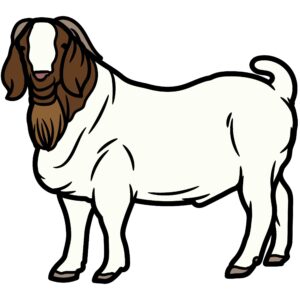 Boer goats are a popular breed of meat goats that originated in South Africa in the early 1900s. They were developed by crossing indigenous goats with European breeds, with the goal of creating a hardy and productive meat goat that could thrive in the harsh African climate.
Boer goats are a popular breed of meat goats that originated in South Africa in the early 1900s. They were developed by crossing indigenous goats with European breeds, with the goal of creating a hardy and productive meat goat that could thrive in the harsh African climate.
Boer goats are known for their large size, with adults weighing between 200 and 300 pounds. They have a distinctive appearance, with a white body and red head. Boer goats have long, curved horns that are used for defense and foraging.
The meat of Boer goats is highly prized for its flavor and tenderness. It is lean and well-marbled, with a rich, gamey taste that is characteristic of goat meat. Boer goats are also known for their high fertility and milk production, which makes them a valuable asset to farmers and meat producers.
Boer goats are in high demand as a source of meat, both domestically and internationally. They are widely raised in South Africa, as well as in many other countries around the world. In recent years, the popularity of Boer goats as a meat source has increased significantly, due to their versatility and adaptability as a livestock option.
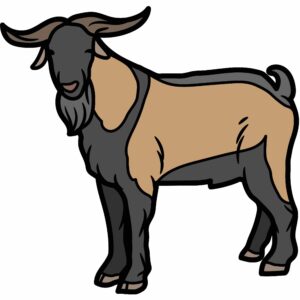 Spanish goats, also known as brush goats or scrub goats, are a hardy and adaptable breed of meat goats that are native to the United States. They are believed to have descended from goats brought to the Americas by Spanish explorers in the 1500s.
Spanish goats, also known as brush goats or scrub goats, are a hardy and adaptable breed of meat goats that are native to the United States. They are believed to have descended from goats brought to the Americas by Spanish explorers in the 1500s.
Spanish goats are small to medium in size, with adults weighing between 100 and 200 pounds. They have a wide range of coat colors, including white, black, brown, and red, and they may have short or long hair. Spanish goats have short, straight horns that are used for defense and foraging.
Spanish goats are known for producing lean, flavorful meat that is high in protein and low in fat. Their meat has a slightly sweet, nutty taste that is characteristic of goat meat. Spanish goats are also valued for their ability to thrive in a variety of environments, including brushy and mountainous areas where other livestock may struggle to survive.
Spanish goats are popular as a source of meat in the United States, and they are also raised for meat in other countries around the world. They are in high demand due to their hardiness, adaptability, and the quality of their meat.
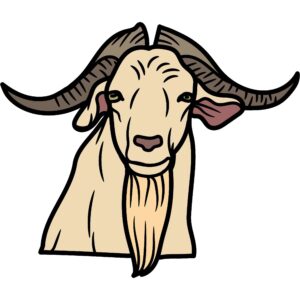 Kiko goats are a breed of meat goats that originated in New Zealand in the late 1980s. They were developed by crossing local feral goats with imported dairy breeds, with the goal of creating a hardy, fast-growing meat goat that could thrive in the harsh New Zealand climate.
Kiko goats are a breed of meat goats that originated in New Zealand in the late 1980s. They were developed by crossing local feral goats with imported dairy breeds, with the goal of creating a hardy, fast-growing meat goat that could thrive in the harsh New Zealand climate.
Kiko goats are large, with adults weighing between 200 and 300 pounds. They have a solid build, with a deep chest and strong legs. Kiko goats come in a variety of coat colors, including white, black, brown, and red, and they may have short or long hair. Kiko goats have short, straight horns that are used for defense and foraging.
The meat of Kiko goats is lean and flavorful, with a slightly sweet, nutty taste that is characteristic of goat meat. Kiko goats are known for their high fertility and growth rate, which makes them an efficient and productive choice for meat production.
Kiko goats are popular as a source of meat in New Zealand and other countries around the world. They are in high demand due to their hardiness, adaptability, and the quality of their meat. Kiko goats are well-suited to a variety of environments, including brushy and mountainous areas where other livestock may struggle to thrive.
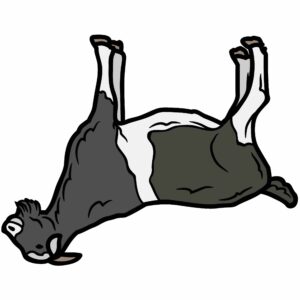 Myotonic goats, also known as Tennessee Fainting goats or Stiff-Leg goats, are a breed of meat goats that originated in the United States in the late 1800s. They were developed by crossing local feral goats with imported dairy breeds, with the goal of creating a hardy, fast-growing meat goat that could thrive in the harsh Tennessee climate.
Myotonic goats, also known as Tennessee Fainting goats or Stiff-Leg goats, are a breed of meat goats that originated in the United States in the late 1800s. They were developed by crossing local feral goats with imported dairy breeds, with the goal of creating a hardy, fast-growing meat goat that could thrive in the harsh Tennessee climate.
Myotonic goats are medium to large in size, with adults weighing between 150 and 250 pounds. They have a distinctive appearance, with a sturdy build and short, stocky legs. Myotonic goats come in a variety of coat colors, including white, black, brown, and red, and they may have short or long hair. Myotonic goats have short, straight horns that are used for defense and foraging.
The meat of Myotonic goats is lean and flavorful, with a slightly sweet, nutty taste that is characteristic of goat meat. Myotonic goats are known for their high fertility and growth rate, which makes them an efficient and productive choice for meat production.
Myotonic goats are popular as a source of meat in the United States and other countries around the world. They are in high demand due to their hardiness, adaptability, and the quality of their meat. Myotonic goats are well-suited to a variety of environments, including brushy and mountainous areas where other livestock may struggle to thrive.
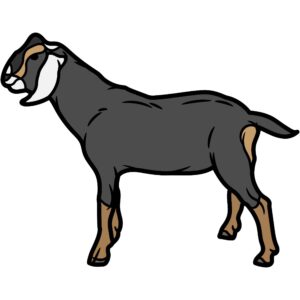 Anglo-Nubian goats are a breed of meat goats that originated in England in the late 1800s. They were developed by crossing local dairy goats with imported Nubian goats from the Middle East, with the goal of creating a hardy, fast-growing meat goat that could thrive in the temperate English climate.
Anglo-Nubian goats are a breed of meat goats that originated in England in the late 1800s. They were developed by crossing local dairy goats with imported Nubian goats from the Middle East, with the goal of creating a hardy, fast-growing meat goat that could thrive in the temperate English climate.
Anglo-Nubian goats are large, with adults weighing between 200 and 300 pounds. They have a distinctive appearance, with a long, narrow head and long, pendulous ears. Anglo-Nubian goats come in a variety of coat colors, including white, black, brown, and red, and they may have short or long hair. Anglo-Nubian goats have short, straight horns that are used for defense and foraging.
The meat of Anglo-Nubian goats is lean and flavorful, with a slightly sweet, nutty taste that is characteristic of goat meat. Anglo-Nubian goats are known for their high fertility and milk production, which makes them a valuable asset to farmers and meat producers.
Anglo-Nubian goats are popular as a source of meat in England and other countries around the world. They are in high demand due to their hardiness, adaptability, and the quality of their meat. Anglo-Nubian goats are well-suited to a variety of environments, including brushy and mountainous areas where other livestock may struggle to thrive.
In conclusion, meat goats are an increasingly popular source of protein worldwide due to their versatility, adaptability, and sustainability as a livestock option. There are many breeds of meat goats, each with its own unique characteristics and qualities that make it an excellent choice for meat production.
In this article, we have explored five of these breeds: Boer goats, Spanish goats, Kiko goats, Myotonic goats, and Anglo-Nubian goats. We have discussed their origin and history, physical characteristics, meat quality and flavor, and popularity and demand as a meat source.
While these five breeds are among the most popular and widely raised meat goats, there are many other breeds that are also highly valued for their meat production capabilities. Some of these include the Savanna goat, the Kalahari Red goat, and the Australian Meat Goat.
Overall, the versatility and growing popularity of meat goats as a source of meat is a testament to their value as a sustainable and efficient livestock option. Whether you are a farmer, a meat producer, or simply a fan of goat meat, there is a breed of meat goat that is sure to meet your needs and preferences.